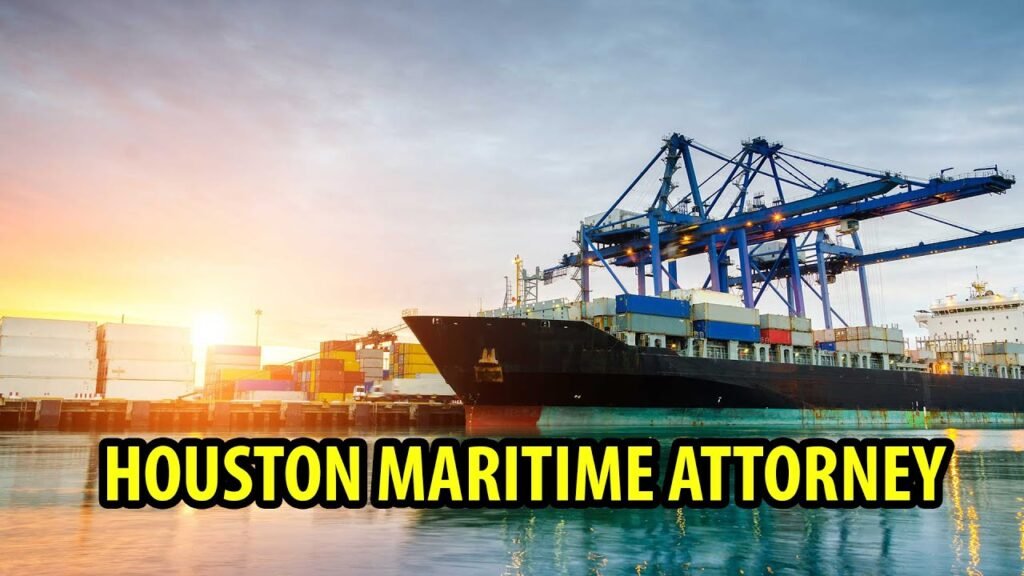Houston, as a major port city, plays a pivotal role in the maritime industry. With its bustling ports and thriving shipping industry, the city sees its fair share of maritime activities and, consequently, maritime legal issues. Whether you’re a seaman injured on the job, a business owner facing cargo disputes, or a company dealing with environmental regulations, understanding maritime law is crucial. This is where a Houston maritime attorney becomes an invaluable ally, guiding you through the complex legal landscape.

Understanding Maritime Law
Maritime law, also known as admiralty law, governs legal matters related to navigable waters. This branch of law is vast, covering everything from personal injuries at sea to cargo disputes and environmental regulations. Understanding its scope and key components is essential for anyone involved in the maritime industry.
Definition and Scope of Maritime Law
Maritime law is a specialized field that addresses issues such as vessel operations, marine commerce, and the rights of seafarers. It encompasses both domestic and international laws, making it a complex area of practice.
Key Components of Maritime Law
Some of the critical aspects of maritime law include personal injury claims under the Jones Act, cargo disputes, environmental regulations, and vessel collisions. Each of these components requires a deep understanding of the law and its application in real-world scenarios.
Read Also : How to Negotiate Student Loan Settlement Easily in 2024
Why You Need a Houston Maritime Attorney
Houston’s maritime industry is robust, but it also comes with unique legal challenges. Whether you’re dealing with an injury, a contractual dispute, or regulatory compliance, having a maritime attorney on your side can make all the difference.
Common Maritime Issues in Houston
Given the city’s strategic location and industrial activities, common maritime issues include worker injuries, vessel accidents, cargo disputes, and environmental compliance. Each of these areas requires specialized legal expertise to navigate effectively.
Legal Expertise and Local Knowledge
A Houston maritime attorney brings not only legal expertise but also a deep understanding of local regulations and industry practices. This local knowledge is crucial in ensuring that your case is handled with the utmost competence.
Types of Maritime Cases Handled
Maritime law is diverse, and attorneys in this field handle a wide range of cases. Here are some of the most common types:
Personal Injury Claims
Injuries at sea can be severe, and maritime workers have specific legal protections under laws like the Jones Act and the Longshore and Harbor Workers’ Compensation Act (LHWCA).
Jones Act Claims
The Jones Act provides seamen with the right to sue their employers for negligence. This is a critical area of maritime law, as it directly impacts the livelihood and well-being of maritime workers.
Longshore and Harbor Workers’ Compensation Act (LHWCA)
The LHWCA covers dock workers and other maritime employees who are not seamen. It provides compensation for injuries sustained on the job, ensuring that workers are protected even in this high-risk environment.
Cargo Disputes
Cargo disputes often arise due to damage, loss, or misdelivery of goods. Resolving these disputes requires a thorough understanding of both maritime law and commercial practices.
Vessel Collisions
Vessel collisions can lead to significant damage and legal complications. Maritime attorneys are skilled in handling these cases, ensuring that liability is properly assigned and damages are recovered.
Environmental Regulations
With increasing environmental regulations, maritime companies must ensure compliance to avoid hefty fines and legal challenges. Attorneys in this field help navigate the complex web of laws and regulations that govern environmental protection in the maritime industry.
Read Also : The Ultimate Guide to Retirement Planning: Tips and Strategies
The Jones Act and Its Implications
The Jones Act is a cornerstone of maritime law, providing essential protections for seamen. Understanding this law and its implications is crucial for anyone working in the maritime industry.
Overview of the Jones Act
The Jones Act allows seamen who are injured due to their employer’s negligence to seek compensation. This law is vital for ensuring that maritime workers receive the care and financial support they need after an injury.
Rights of Seamen Under the Jones Act
Seamen have the right to a safe working environment. If an employer fails to provide this, the Jones Act allows the injured worker to sue for damages. This can include compensation for medical expenses, lost wages, and pain and suffering.
How a Maritime Attorney Can Help
Navigating a Jones Act claim can be complex. A maritime attorney can help by gathering evidence, negotiating with employers, and ensuring that your rights are fully protected throughout the legal process.
Longshore and Harbor Workers’ Compensation Act (LHWCA)
The LHWCA is another critical piece of legislation in maritime law, providing protections for workers who are not covered by the Jones Act.
Who Is Covered by the LHWCA?
The LHWCA covers longshoremen, harbor workers, and other non-seaman maritime employees. This law provides compensation for injuries that occur on navigable waters or adjoining areas like docks and terminals.
Benefits Under the LHWCA
Workers covered by the LHWCA are entitled to medical care, disability payments, and compensation for lost wages. These benefits are crucial for workers who are injured on the job and unable to work.
The Role of an Attorney in LHWCA Claims
A maritime attorney can assist with LHWCA claims by ensuring that all necessary documentation is filed, representing the worker in hearings, and negotiating settlements with employers or insurance companies.
Environmental Regulations in Maritime Law
Environmental compliance is a significant concern in the maritime industry. Failure to adhere to regulations can lead to severe penalties and legal action.
Overview of Environmental Laws Affecting Maritime Operations
Several environmental laws impact maritime operations, including the Clean Water Act and the Oil Pollution Act. These laws regulate everything from waste disposal to oil spills, making compliance a complex and ongoing challenge.
Legal Challenges and Compliance
Maritime companies must navigate a myriad of regulations to remain compliant. This includes ensuring that vessels meet environmental standards and that operations do not harm marine ecosystems.
How Attorneys Navigate Environmental Cases
Environmental cases in the maritime industry require a deep understanding of both the law and the science behind environmental protection. Maritime attorneys work closely with experts to build strong cases and ensure that their clients meet all regulatory requirements.
Read Also : 5 Reasons Why Car Insurance is Compulsory in India
Steps to Take After a Maritime Injury
If you’re injured in a maritime accident, taking the right steps immediately can make a significant difference in your recovery and your legal case.
Immediate Actions to Protect Your Rights
After an injury, seek medical attention immediately. Even if your injuries seem minor, getting a medical evaluation is crucial. Additionally, report the injury to your employer and ensure that the incident is documented.
Importance of Documentation and Evidence
Documentation is key in any legal case. Gather evidence such as photographs of the injury site, witness statements, and medical records. This information will be essential for your attorney when building your case.
Contacting a Maritime Attorney
The sooner you contact a maritime attorney, the better. An attorney can guide you through the process, ensuring that you don’t miss any critical steps and that your rights are protected.
Choosing the Right Houston Maritime Attorney
Selecting the right attorney can be the difference between winning and losing your case. Here are some tips to help you choose the best legal representation.
What to Look for in a Maritime Lawyer
Look for an attorney with specific experience in maritime law. This field is highly specialized, and a lawyer who focuses on other areas may not have the necessary expertise.
Questions to Ask During the Initial Consultation
During your first meeting with a potential attorney, ask about their experience with cases similar to yours, their success rate, and how they plan to approach your case.
Evaluating Experience and Success Rates
Experience matters in maritime law. An attorney with a strong track record in handling maritime cases will likely be more effective in representing your interests.
The Legal Process in Maritime Cases
Understanding the legal process can help you feel more confident as you navigate your case.
Initial Consultation and Case Evaluation
Your attorney will begin by evaluating your case during an initial consultation. This is where you’ll discuss the details of your situation, and the attorney will determine the best course of action.
Filing a Claim or Lawsuit
If your case warrants it, your attorney will file a claim or lawsuit on your behalf. This involves submitting the necessary paperwork and formally beginning the legal process.
Settlement vs. Trial
Many maritime cases are settled out of court, but some may go to trial. Your attorney will negotiate with the opposing party to reach a fair settlement, but if a settlement can’t be reached, they will represent you in court.
How a Maritime Attorney Builds Your Case
Building a strong case requires careful preparation and a strategic approach.
Gathering Evidence
Your attorney will gather all relevant evidence to support your case, including medical records, witness statements, and expert testimony.
Working with Experts
In many maritime cases, expert testimony is crucial. Your attorney will work with medical experts, maritime engineers, and other professionals to strengthen your case.
Negotiating with Insurance Companies
Insurance companies often try to minimize payouts. Your attorney will negotiate on your behalf to ensure that you receive the compensation you deserve.
Challenges in Maritime Cases
Maritime law is complex, and several challenges can arise during a case.
Complexities of Maritime Law
Maritime law involves a unique set of rules and regulations, making it more complex than other areas of law. Your attorney must have a deep understanding of these complexities to navigate your case effectively.
Jurisdictional Issues
Determining the correct jurisdiction can be challenging in maritime cases, especially if the incident occurred in international waters or involved multiple parties from different locations.
Statute of Limitations
Maritime cases are subject to strict statutes of limitations, meaning you only have a limited time to file a claim. Missing this deadline can result in your case being dismissed.
The Cost of Hiring a Maritime Attorney
Understanding the costs involved in hiring a maritime attorney is important for making an informed decision.
Understanding Legal Fees and Costs
Legal fees can vary depending on the complexity of your case and the attorney’s experience. Make sure to discuss fees upfront so there are no surprises later on.
Contingency Fee Arrangements
Many maritime attorneys work on a contingency fee basis, meaning they only get paid if you win your case. This arrangement can make legal representation more accessible, as you don’t have to pay upfront fees.
Is Hiring an Attorney Worth the Cost?
Given the complexities of maritime law and the potential compensation involved, hiring an attorney is often well worth the cost. An experienced maritime lawyer can significantly increase your chances of a successful outcome.
Real-Life Case Studies
Looking at real-life case studies can provide insight into the effectiveness of maritime attorneys.
Successful Maritime Injury Claims
Many seamen and maritime workers have successfully won compensation for their injuries through the help of skilled attorneys. These cases often involve detailed investigations and strong evidence.
Resolving Cargo Disputes
Cargo disputes can be resolved efficiently with the right legal representation. Successful cases often involve clear documentation and effective negotiation.
Environmental Litigation Outcomes
Environmental cases can be complex, but with the right attorney, companies have successfully navigated these challenges, ensuring compliance and avoiding hefty penalties.
Conclusion
Maritime law is a complex and specialized field that requires expert legal representation. Whether you’re dealing with a personal injury, a cargo dispute, or environmental compliance, a Houston maritime attorney can guide you through the legal process and help you achieve a successful outcome. Protecting your rights and ensuring fair treatment is essential, and with the right attorney, you can confidently navigate the challenges of maritime law.
FAQs
The statute of limitations for maritime cases can vary, but typically, you have three years from the date of the incident to file a claim. However, it’s crucial to consult with an attorney as soon as possible to ensure you don’t miss important deadlines.
To qualify for a Jones Act claim, you must be a seaman who spends a significant amount of time working on a vessel in navigable waters. If you’re injured due to your employer’s negligence, you may be eligible to file a claim.
Yes, maritime attorneys often assist companies with navigating complex environmental regulations. They can help ensure that your operations comply with the law and represent you in any related legal challenges.
Bring any documentation related to your case, including medical records, incident reports, photographs, and witness statements. The more information you provide, the better your attorney can assess your case.
The duration of a maritime case can vary depending on the complexity of the issues involved. Some cases are resolved in a few months, while others may take years, especially if they go to trial.




Pingback: Offshore Accident Lawyer: Guide to Legal Representation - HindiMetro